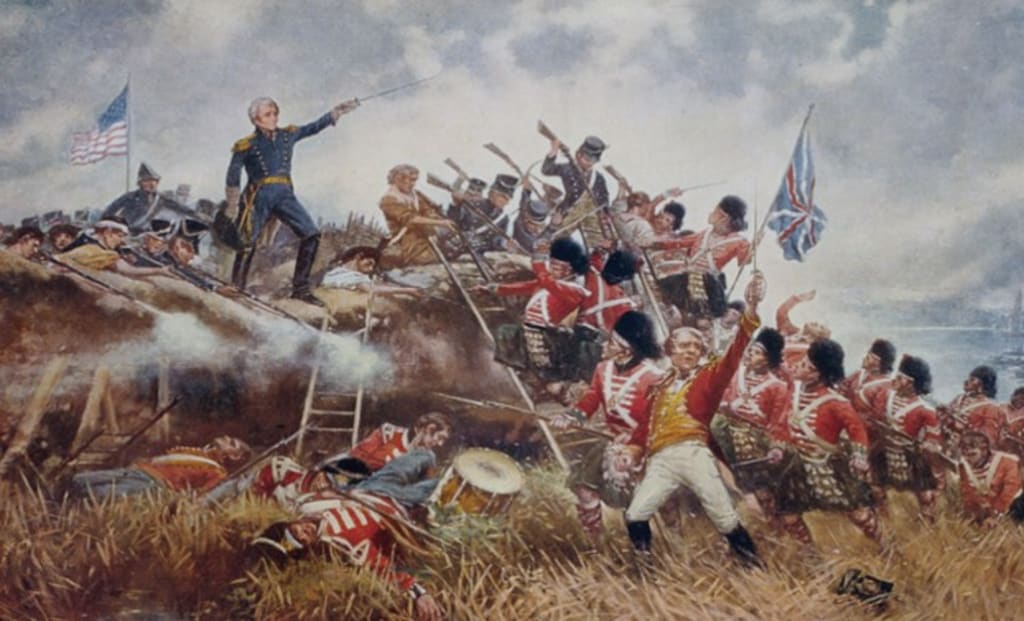The War of 1812
The Forgotten Second War of Independence

The War of 1812, one of many “forgotten wars”, is often ignored despite the part it played in forming the identities of the nations of North America. The United States, which, along with Canada, probably remembers the war best, experienced massive repercussions from the war, some physical—and some mental. The war helped stimulate the creation of the powerful standing army and navy America had never had before and would become known for in later conflicts; it created a new American nationalism based around various triumphs in the war, no matter how small; and it resulted in significant losses for the Native Americans, despite being a stalemate war between England and America. These changes shaped the American people as a whole and laid the groundwork for the nation we know today.
The US military force before the war was practically unproven, and Congress had not seen the need for a powerful navy or a professional army. At the start of the war, the US Navy consisted of sixteen warships, only twelve of which had any military potential. On the other side, the British had over 600 vessels, including 120 ships of the line, ships that vastly outgunned the Americans’ heaviest ships, their frigates. Luckily for the Americans, the American Navy had several skilled captains in charge of these ships, resulting in shocking victories against the “mistress of the seas”. The USS Constitution in particular gained fame nationwide for its victories, including an impressive escape from four British frigates, and the destruction of the Guerrière. Ultimately though, the US Navy could not make a massive impact on the war. Their limited size prevented them from making any sort of dent in the British fleet, which eventually succeeded in completely disrupting US trade. Thanks to the blockade and increased British naval presence, the great American frigates that had been so successful early in the war became practically useless, leaving the US to rely on privateers to disrupt British commerce and military ships alike. During the course of the war these privateers would become a point of pride for Americans, with Henry Adams praising the schooners, “Not her battles, but her escapes won for her the open-mouthed admiration of the British captains”. By war’s end, the privateer fleet had captured some 1300 ships, 1000 of which had been caught within the last eighteen months of the war, leaving the British to lose about two ships per day. These conflicts taught the American people, and more importantly Congress, that to win a war, one needs to control the coast, and the only way to control the coast was through a strong navy. Shortly after the war, Congress would authorize the construction of several new ships and pass the sensibly named “Act for the gradual increase of the Navy” which would allocate $1,000,000 a year for eight years to construct nine ships of the line and twelve heavy frigates. Many later Americans would also look back at this time to justify the expansion of the Navy, most notably Theodore Roosevelt, who wrote a book on the War of 1812 essentially arguing for an increased navy that he would effect in the creation of the Great White Fleet.
During the war, America did not really have a professional army, opting instead for state run militias. This turned out to be a horrible mistake. Despite outnumbering the British and their Native American allies significantly, thanks in part to Napoleon, the lack of proper training and commanders who knew what they were doing was disastrous for the land campaigns of the US soldiers. First and worst of all the defeats was the Siege of Detroit, in which General William Hull, who was supposed to be invading Canada, surrendered before any fighting had actually begun out of fear of the enemy numbers, numbers that had been inflated through trickery. If it hadn't been for the exploits of the USS Constitution, this loss might have made the whole nation fall into defeatism. A second invasion of Canada was sent out, and they too fell in battle, but did manage to kill the British General Isaac Brock, thus severing Britain's greatest tie to Shawnee chief Tecumseh, weakening their alliance. As the war continued, the Americans began to learn how to mobilize, and were prepared by the time the British forces freed up after Napoleon’s abdication were sent as naval invasions. While the British were able to burn Washington, D.C., the American troops handled many other invasions much better. The most spectacular of these battles was the famous Battle of New Orleans, where 14,500 British troops lost to 4,700 American soldiers under the lead of then general and future president Andrew Jackson. While this battle did take place after the peace treaty was signed, it was nevertheless an impressive victory that lives on in the American consciousness even now.
At the time of the war’s beginning, the first generation of natural born Americans was starting to forge a uniquely American identity. Thus, the War of 1812, being the first official war since independence, had a great effect on the American psyche. To the American people, this hadn’t merely been a war, but a test of Republican ideals, and the nation’s ability to stalemate the British, one of the major world powers, was proof that the American Experiment was working. At the beginning of the war, there was a sense that American pride and honor needed to be restored in the wake of British attempts to undermine American sovereignty. Many in favor of the war acknowledged that the US was not exactly ready for war against a superpower, including John Adams who wrote that “this country ought to have been better prepared for war, especially by sea,” and, “Defeat after defeat. I hope three defeats will teach us the necessity of system, subordination, discipline and obedience.” While the success at sea brought much needed hope, the failures on land, particularly the loss of Detroit, took their toll on the people. By 1813, Federalists, many of whom had opposed the war from the start, had begun to wonder what point there was in fighting this war. Massachusetts congressman Josiah Quincy III said that the only explanation he could see for the war was an Anglophobe Madison reciting the nursery rhyme, “Fee, fi, fo, fum, I smell the blood of an Englishman, Be he alive or be he dead, I will have some.” By the time of the war’s end, however, the victories that had been won on land and sea—particularly the Battle of New Orleans, despite its lateness and irrelevance to the outcome of the war—and the neutrality of the treaty had brought about a uniquely American spirit in the people. They had not only fought one of the strongest nations of their time but fought it to a standstill, and to a brand new, largely untested nation that was a victory. Most ignored the advantages they held in the war and attributed the not quite victory to the American people. A uniquely American culture began to develop as the nation bonded over the shared victory. In particular, one poem written during the siege of Fort McHenry, inspired by its massive flag, was turned into a song after the war, put to the tune of an older song created for the beginning of the after-supper drinking of an English music society. The song became increasingly popular, eventually becoming “The Star-Spangled Banner” and the national anthem of the United States. This idea of what it means to be an American created a nationalist sense that the American ideals should be spread, essentially giving light to this first generation of Americans of their “Manifest Destiny”, an idea that would eventually become not just a theory, but a practice, resulting in the expansion west, some of which happened directly after the war when the US took more Native American land partly as a punishment for their participation.
Native Americans fought on both sides of the war, picking whichever side of the conflict was most beneficial to their tribe. They viewed themselves as allies, although they were treated as vassals, and both the Americans and British were annoyed by their “unreliability” as they fought for their own interests. Despite this, both sides relied on the Native American fighters. In the American military, the Native Americans served as their most effective light troops, although their achievements were often ignored. The British, on the other hand, needed Native American troops to compensate for their own woefully outnumbered troops. To this end they recruited Tecumseh, leader of the Shawnee, to fight with them in exchange for an independent Shawnee nation, one that would serve British interests by being a buffer state and helping curb American expansion. Tecumseh was essential in securing an almost bloodless victory in the Siege of Detroit; moving his troops in a way that created the illusion of many more men was part of what convinced Hull to surrender. Despite this, once Britain realized that they were not going to make gains from the war, they gave up on the buffer state idea and never came back to it, leaving Tecumseh’s people and land at the mercy of American and Canadian expansion. Tecumseh himself died during the Battle of the Thames, killed by an unknown American, marking the end of one of the Native Americans’ fiercest champions. Additionally, the war led to the rise of American militarism that would be turned on the Native Americans after the war. One of the celebrated commanders to come out of the war for the Americans would become the very face of this. Andrew Jackson, the hero of New Orleans would institute the Indian Removal Act only two decades later after being thrust into the presidency by his fame from that battle. At the end of it all, while neither the British nor the Americans ceded territory during the war, or much of anything for that matter, the Native Americans lost much to both sides.
Despite not getting very much recognition, the War of 1812 was an important part of shaping the American culture. It not only taught that first generation how to defend themselves in a world of empires, it also proved that the republic was here to stay, and would not go down lightly. Many of the ideas of what an American is come from this conflict or its aftermath. It also resulted in one of many nails in the coffin for an independent Native American nation, something Native Americans can never forget. The War of 1812, seemingly insignificant to many, had a massive impact upon the American nation and all of the people and peoples that found themselves in her borders.
Sources and Further Reading:
Ian Toll Sixteen Frigates: The Epic History of the Founding of the U.S. Navy
Sandy Antall A Wampum Denied: Procter's War of 1812
Donald Hickey The War of 1812: A Forgotten Conflict
Donald Hickey The War of 1812: Writings from America's Second War of Independence
John Sugden Tecumseh's Last Stand
George Daughan 1812: The Navy's War
About the Creator
History Roundtable
Owner of a history degree and occasional writer of things






Comments
There are no comments for this story
Be the first to respond and start the conversation.